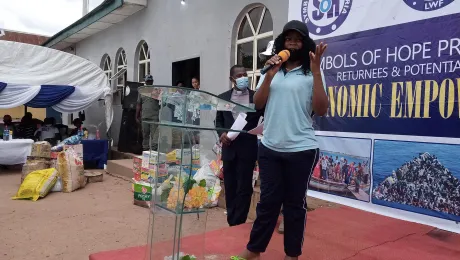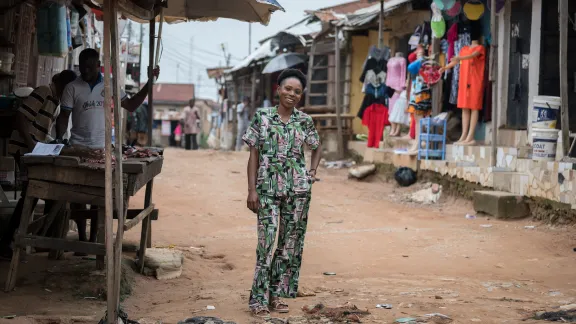
Lidya Nkiruka Udekwe – a participant in LWF project Symbols of Hope – pictured outside her shop in the Lugbe suburb on the outskirts of Abuja, where she makes a living selling clothes. Through this business, she can now provide for her four children. Photo: LWF/Albin Hillert
LWF supports survivors of human trafficking
(LWI) – Harrison Amadi was 28 years old when he left Nigeria in search of a better life. Five years later, he returned traumatized from a journey past dead bodies spread along desert roads, the experience of capsized migrant ships, inhumane prison conditions and physical exploitation.
Harrison is not alone in sharing this fate as a young African setting out to find a better future only to fall prey instead to human traffickers exploiting people for profit. But also, he is not alone in healing from his trauma as a survivor.
Today, Harrison is one of more than 200 people supported annually through Symbols of Hope – a Lutheran World Federation (LWF) project run across three countries on the African continent and implemented in Nigeria through LWF member church Lutheran Church of Christ in Nigeria (LCCN).
Through Symbols of Hope, survivors of human trafficking and potential and returned migrants are supported in the processes of documentation, psychosocial support and counselling, as well as skills training and livelihood support.
It is a process that cannot be rushed.
“In working with returned migrants, we must first work towards gaining their trust,” reflects Rev. Emmanuel Subewope Gabriel of the LCCN, country director of Symbols of Hope Nigeria.
“Returned migrants suffer in trust because their trust was broken when they were trafficked – often with the support of someone close to them. Sometimes, even after a year with us here at Symbols of Hope, we have people who are not sure if or how we can be trusted. But with time and with aid from God, we can gain confidence and trust and support them in their process.”
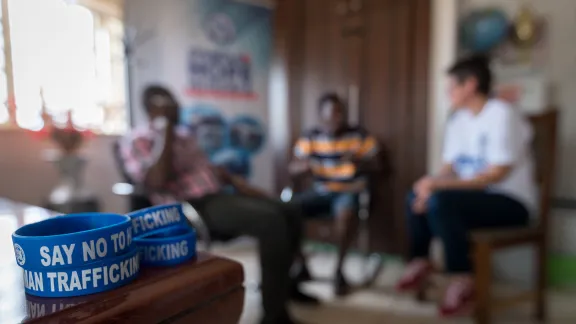
“Say no to human trafficking,” reads a set of wristbands as 36-year-old Harrison Amadi, a returned migrant and participant in Symbols of Hope, shares his story at the project office in Abuja, Nigeria. Photo: LWF/Albin Hillert
We see that every Nigerian is a potential migrant, depending on the many push factors affecting young people in our country, including both poverty and severe insecurity in many parts.
Rev. Emmanuel Gabriel, country director of Symbols of Hope Nigeria
Irregular migration is a widespread issue on the African continent, particularly Nigeria.
“We see that every Nigerian is a potential migrant, depending on the many push factors affecting young people in our country, including both poverty and severe insecurity in many parts,” Rev. Gabriel reflects.
“In search of a greener pasture, young Nigerians have become so vulnerable in the hands of migrant smugglers and human traffickers who daily take them through the horrible journey of the desert, the Mediterranean, subject them to domestic servitude, forced labor, sexual assault, sometimes even sexual slavery. And for those who return, they face stigma and are often disconnected from the families they originally left back home.”
Yet the country director stresses that Symbols of Hope is a successful project. “Since the outset of the project in Nigeria in 2017, the LWF now is affecting the lives of more than 2,000 young people. So many who had been traumatized have been provided psychosocial support that has given them strength to get back on their feet.”
Building hope: from healing to livelihood
For Harrison, it was back in 2022 that he first heard of Symbols of Hope through a friend the project had supported. Since then, it has been a wonderful relationship, he says, noting that he earns an income today as a painter and artist – a skill he describes as a gift from God. “Symbols of Hope has played a good role; today I am healed, I can smile, and I thank God for my life today because so many people (who migrated) have died.”
“My life is a testimony to others,” he adds: “this is why I am not afraid to share my story anywhere. Imagine if tomorrow it was my brother or my cousin…”
His words are echoed by Yetunde (first name only, on request), a survivor of trafficking and forced prostitution. “When I came back from Libya, I was at the point of death. Through Symbols of Hope, I have received life back; the Lord, through Symbols of Hope, has given me life back.”
“Hope means to me life and joy; it is for me to see a future, to see and create a vision of a future where I will possess what I desire,” Yetunde says.
She adds: “I kept praying that if I were saved, I would be a voice for the voiceless. I don’t want my story to die. My vision is to share my story so more people will not fall for traffickers, who are always looking for helpless people. I want to share my story, to tell it.”
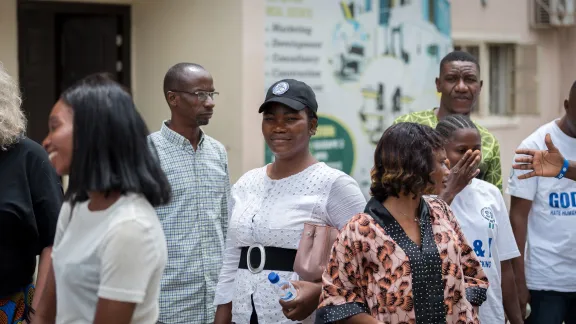
Yetunde is a returned migrant and participant in Symbols of Hope, pictured with other project participants outside the office in Abuja, Nigeria. Photo: LWF/Albin Hillert
While the journey with Symbols of Hope may often start with psychosocial support, the project is wider than merely trauma healing for returned migrants.
Targeting the three main groups of pastors and churches, potential migrants, and returning migrants, Symbols of Hope works on awareness-raising, capacity-building and advocacy. Returned migrants are integral to the work, as many can speak up in their communities and raise their voices to build awareness of the realities of irregular migration.
When the time is right, the project also provides opportunities for skills training and seed capital to provide livelihood support for the project’s participants.
“Symbols of Hope is a huge success because it has restored hope and dignity in so many young people. So many young people have been reintegrated into society. So many young people now understand what it means to make informed decisions about migration,” country director Gabriel concludes.
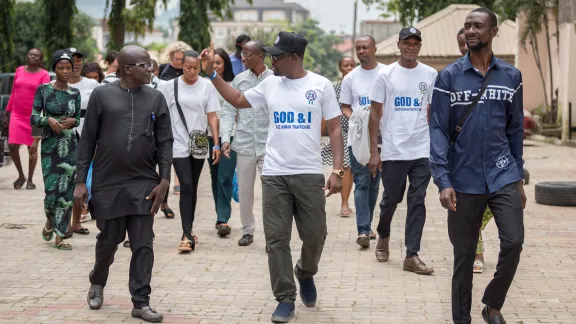
Rev. Emmanuel Subewope Gabriel (left) of the Lutheran Church of Christ in Nigeria, country director of Symbols of Hope Nigeria, in conversation with colleagues and participants at the Symbols of Hope office in Abuja. Photo: LWF/Albin Hillert
